PHI’s Top 23 Moments from 2023
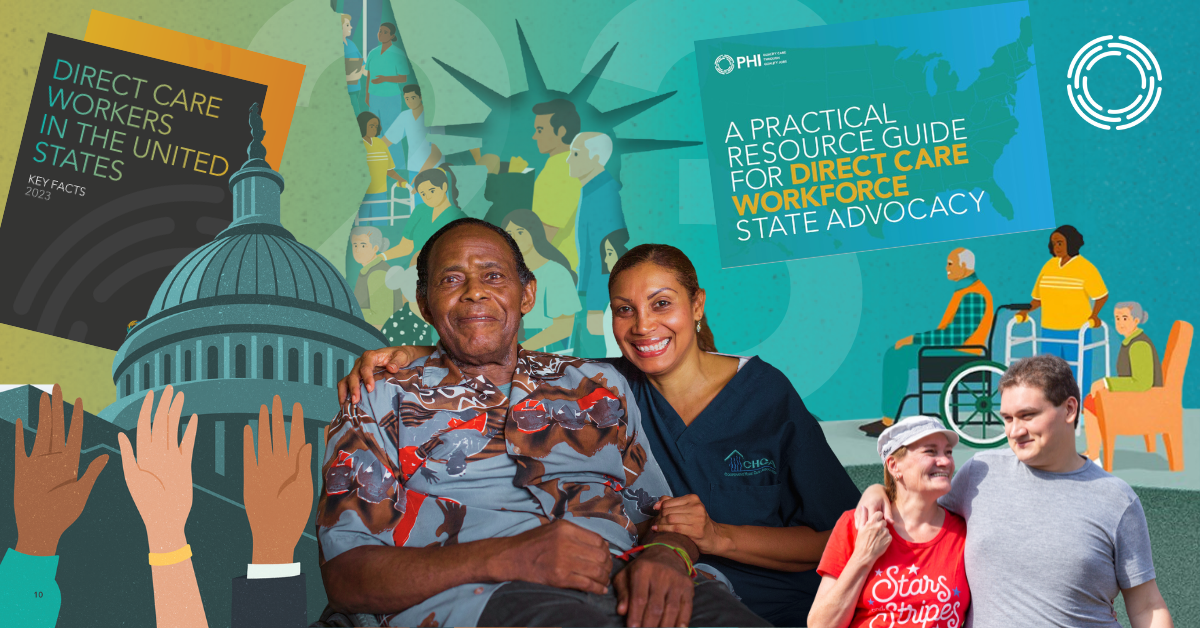
Throughout 2023, new regulations marked a watershed moment for recognizing direct care workers as critical components of the healthcare system. While the proposed rules may require further refinement, they bring to light the importance of fair compensation, data collection, and other critical steps toward sustaining a dedicated and effective workforce—issues long championed by PHI.
Despite increased awareness, the quality of direct care jobs has not improved. These positions are often characterized by inadequate wages, benefits, and working conditions, leading many workers to leave in search of better, more stable employment opportunities, even as the demand for their services increases.
Addressing this challenge requires transformative efforts to enhance the direct care workforce. PHI is at the forefront, utilizing its research, advocacy, workforce innovations, and public education initiatives—rooted in a 360-degree perspective on the long-term care field.
Here are the top 23 moments for PHI in 2023, listed in chronological order.
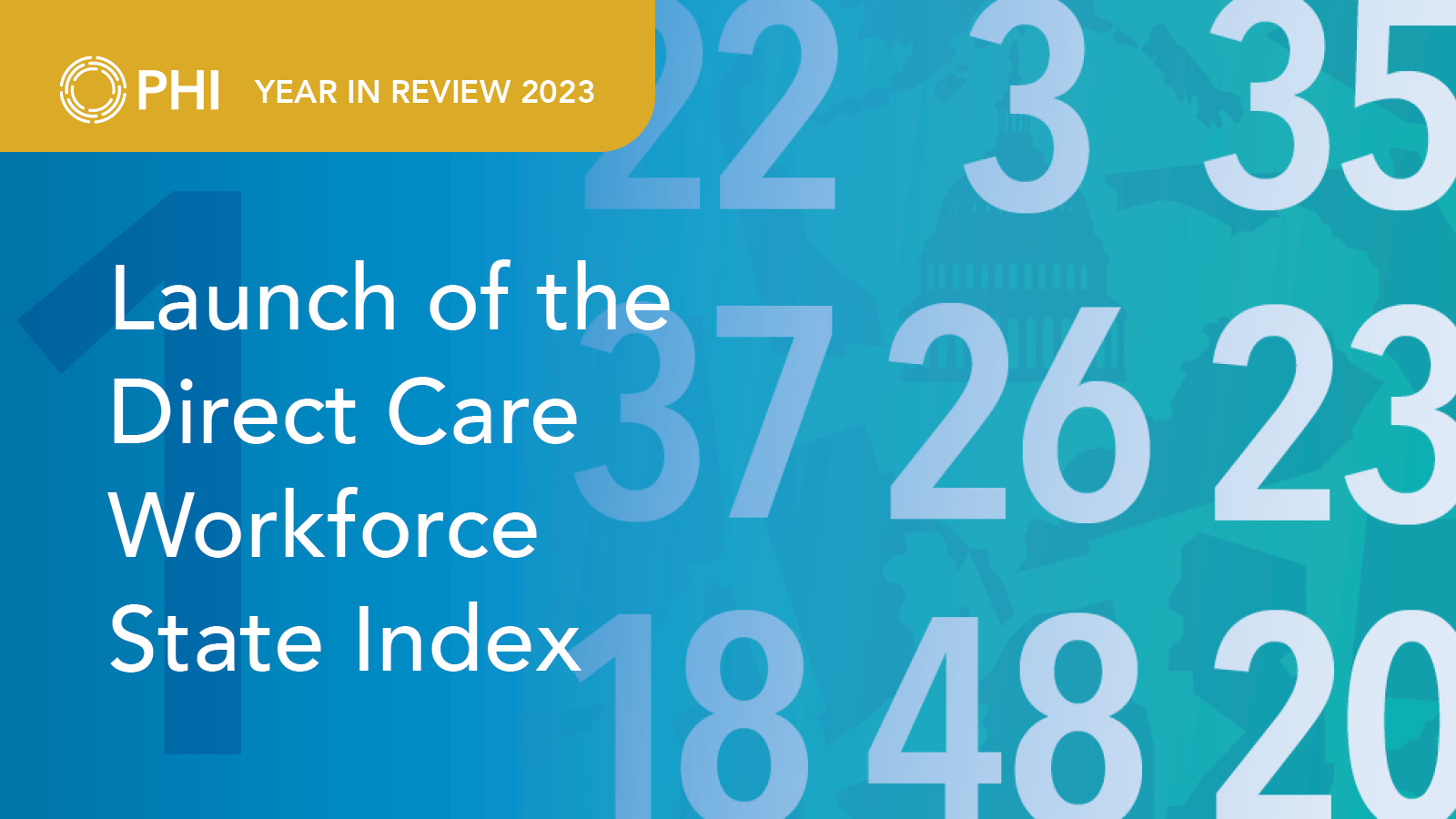
1. Launch of the Direct Care Workforce State Index
In January, PHI released a new online tool, the Direct Care Workforce State Index, designed to help policymakers, advocates, and leaders understand and improve support for direct care workers across states. The index ranks all 50 states and the District of Columbia based on two composite measures: policies supporting these workers and their economic status. These measures cover wage competitiveness, training standards, paid leave policies, and a range of other indicators.
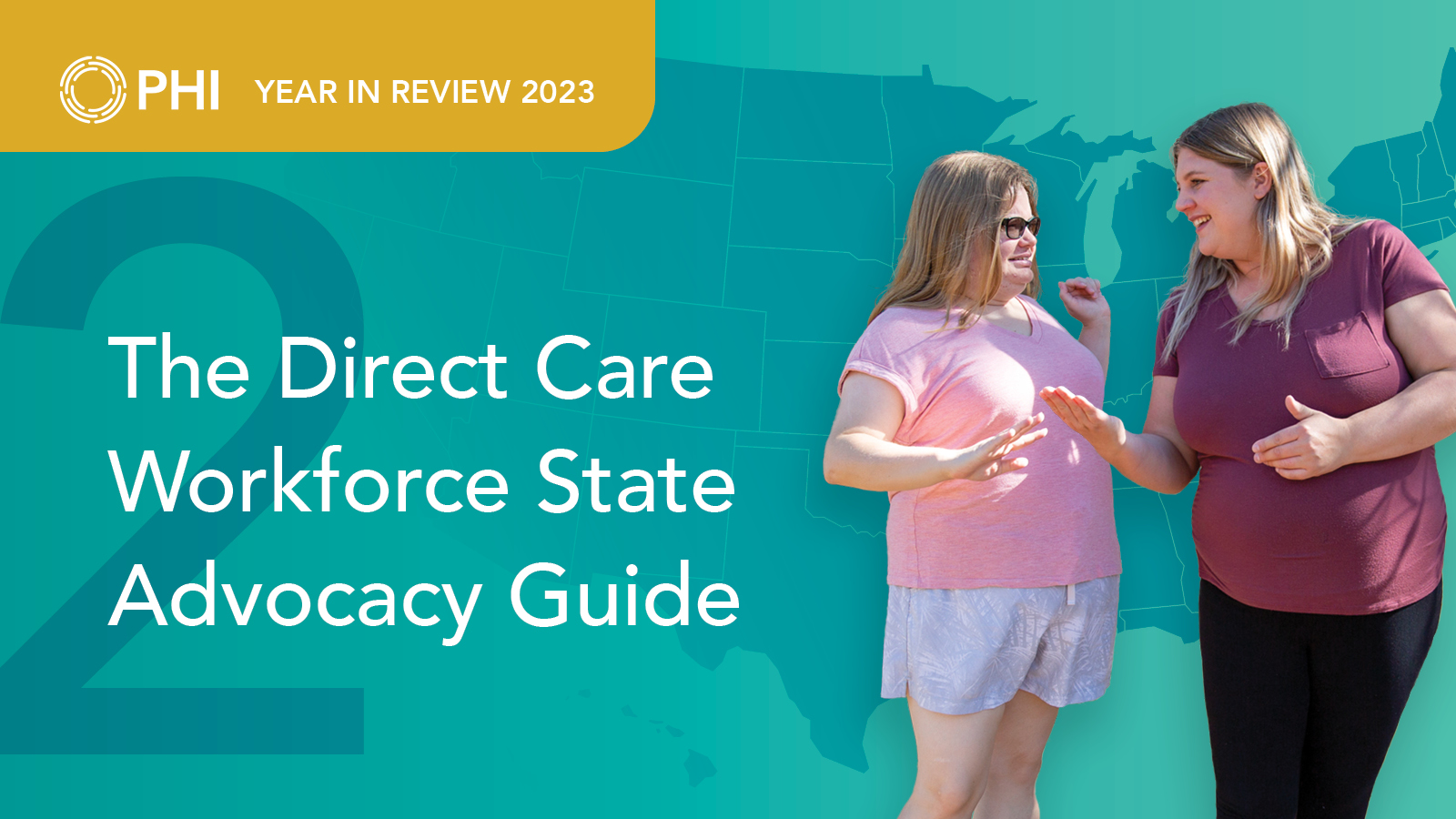
2. The Direct Care Workforce State Advocacy Guide
Recognizing the importance of building advocacy momentum for direct care workers across all states, PHI created a resource guide for state-level advocates in February. This new resource guide provides 60 clear action steps across 20 strategic areas to help state advocates move forward policies that enable direct care workers to thrive in their jobs and everyone to access the quality services and supports they need.
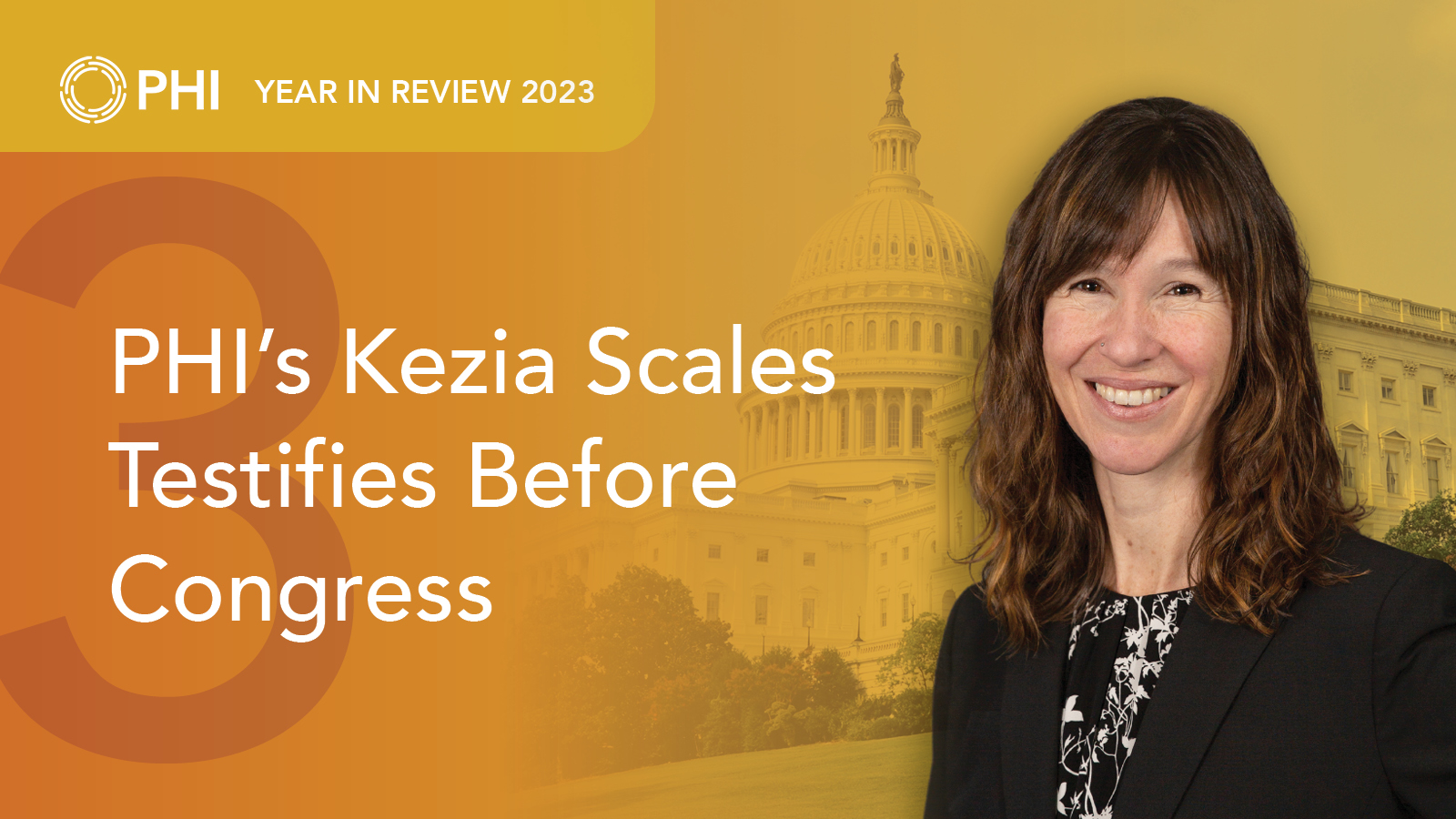
3. PHI’s Kezia Scales Testifies Before Congress
In March, Kezia Scales, PhD, Vice President of Research and Evaluation at PHI, spoke before the U.S. Senate Special Committee on Aging, focused on the importance of investing in the home care workforce and supporting communities of care. On behalf of PHI, she underscored the need for greater investment in this workforce, citing the Better Care Better Jobs Act as a model for transformative change, and pointed out the challenges faced by these workers, including poor job quality leading to a workforce crisis.
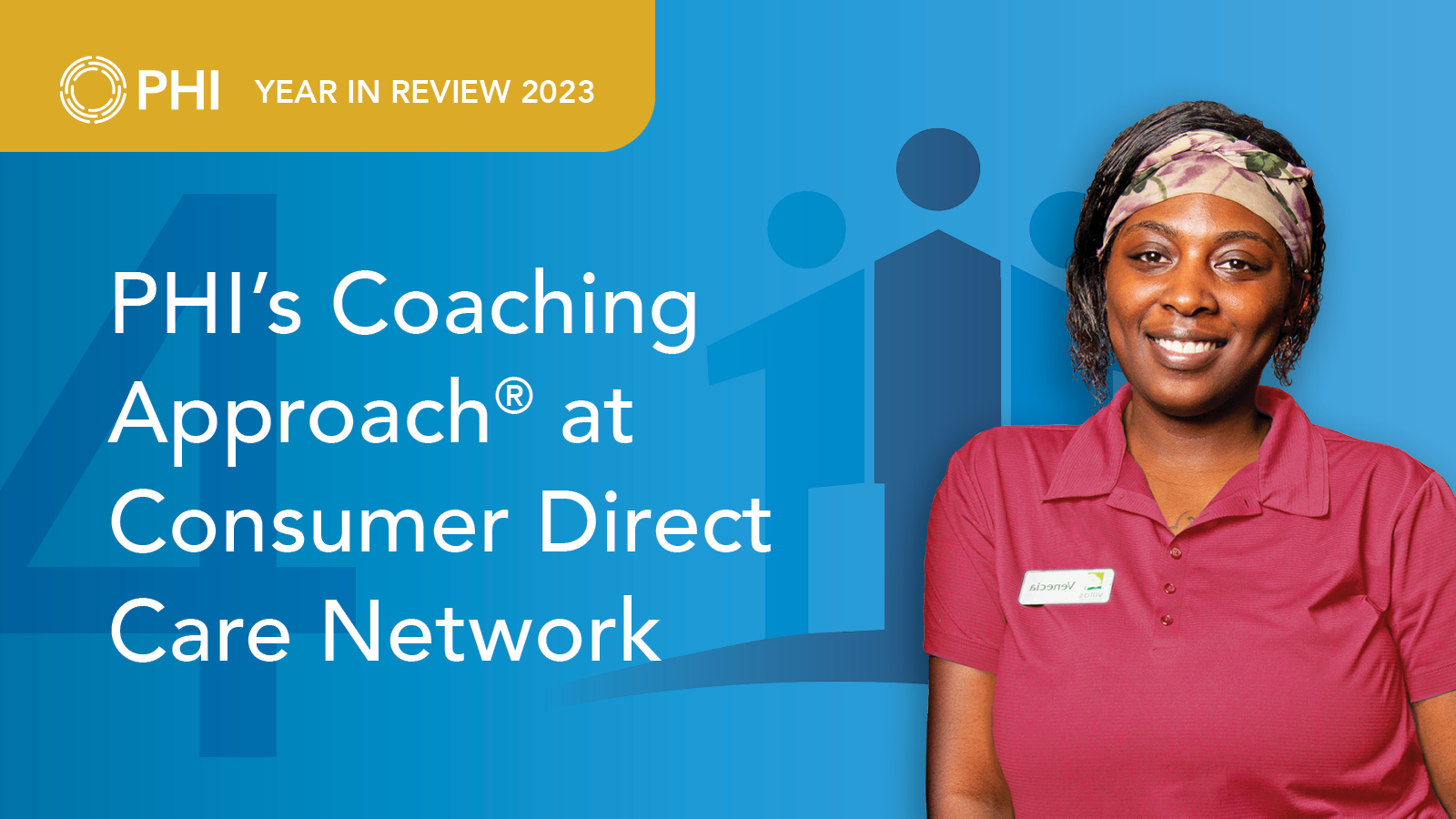
4. PHI’s Coaching Approach® at Consumer Direct Care Network
Earlier this year, we started implementing the PHI Coaching Approach® within Consumer Direct Care Network (CDCN), a national home care organization that provides a range of services with an emphasis on choice and independence. This is a signature curriculum that builds essential communication and problem-solving skills through training and support. CDCN recently expanded into Washington, where they will employ over 40,000 independent providers through the state’s Medicaid-funded home and community-based services program.
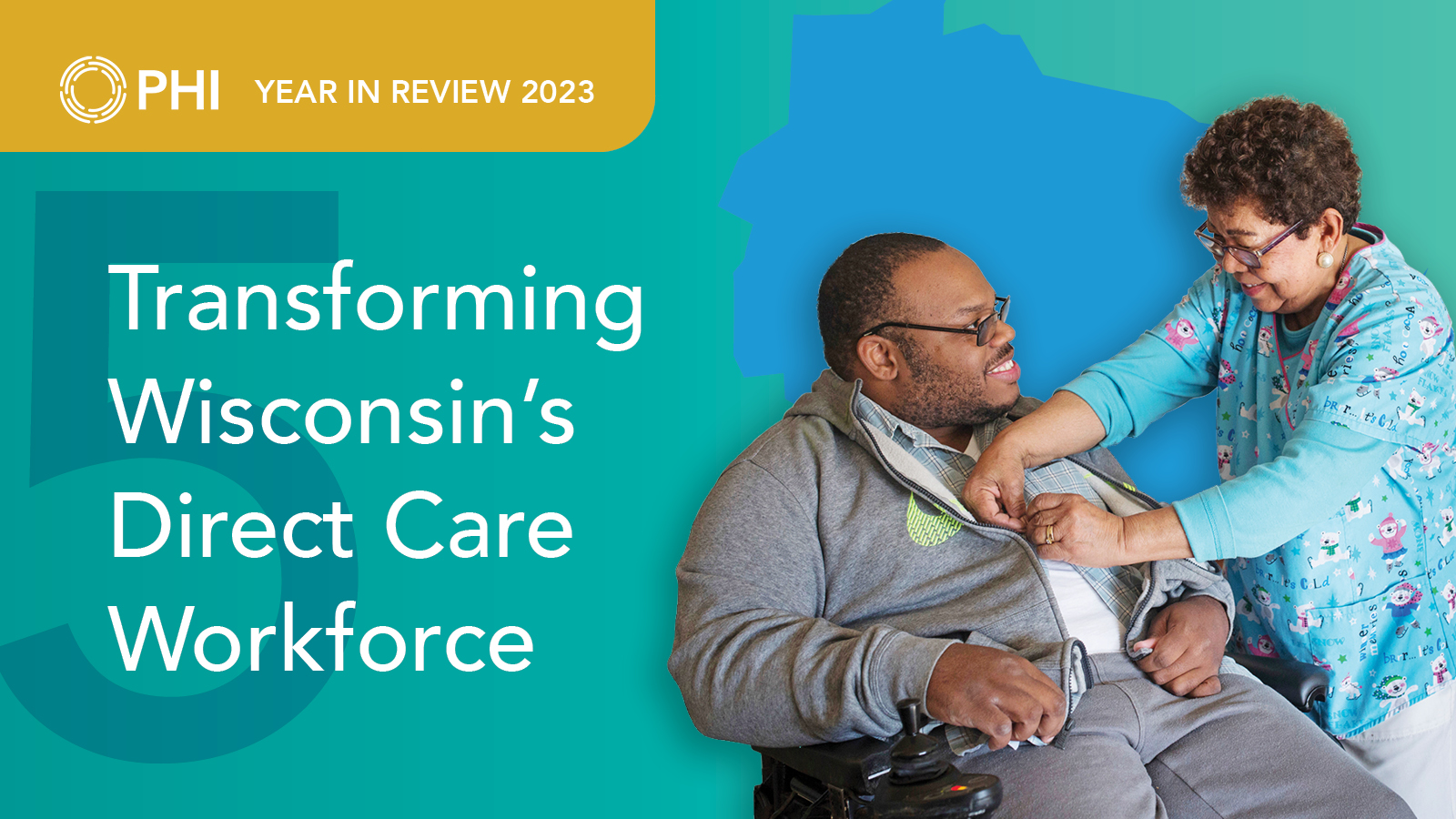
5. Transforming Wisconsin’s Direct Care Workforce
PHI has helped advise Wisconsin’s WisCaregiver Careers program, initially launched in 2018 to recruit nursing assistants in nursing homes. The program, which includes comprehensive training, recruitment, placement, and retention strategies, has been expanded to include home care workers, offering standardized training, certification, access to a job registry, and career advancement opportunities. This expansion aims to professionalize the home care workforce, improve worker recognition and compensation, and address the growing demand for home care services, especially in rural communities.
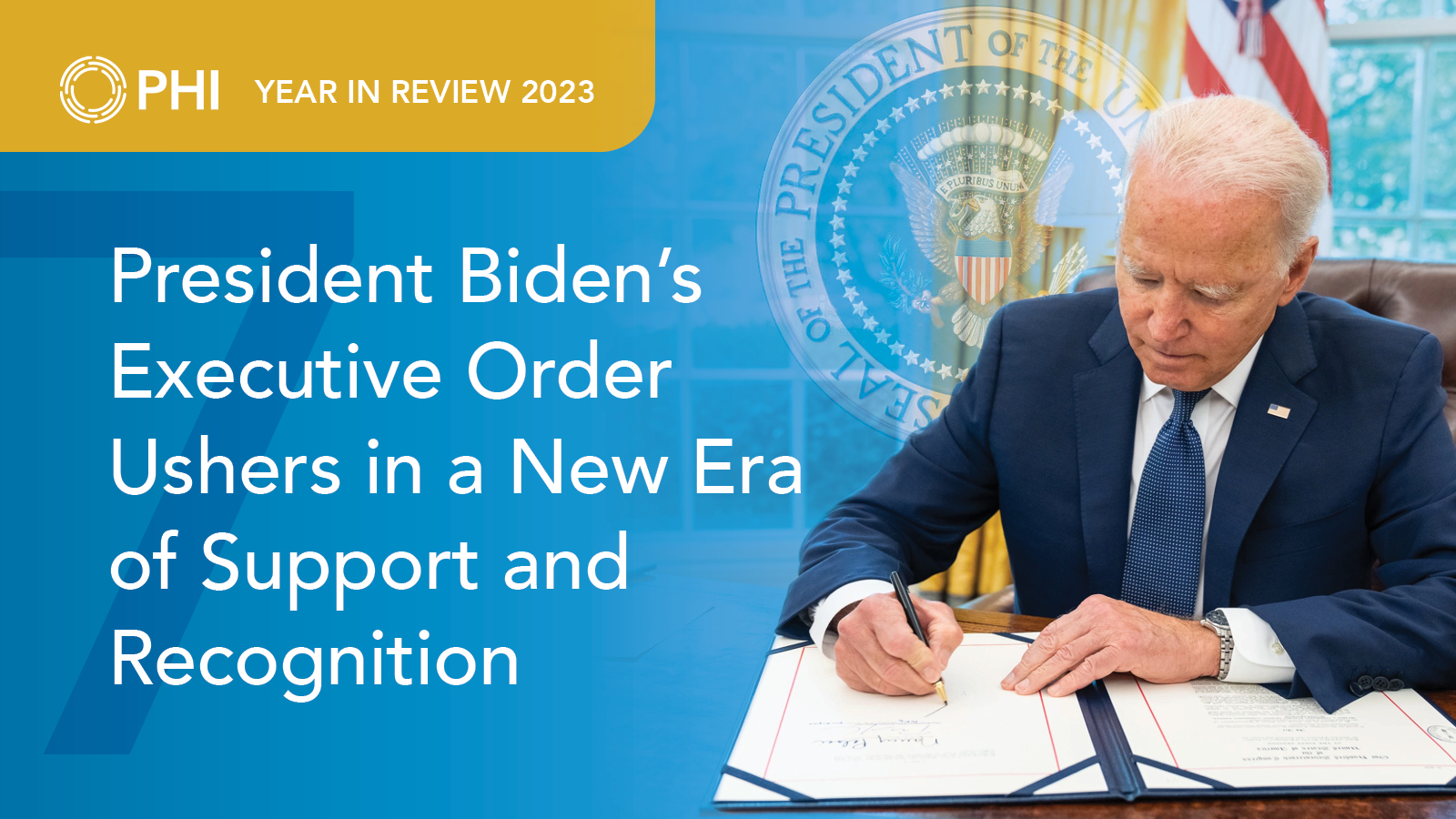
6. President Biden’s Executive Order Ushers in a New Era of Support and Recognition
Senior staff from PHI were honored to witness a historic moment at the White House when President Biden signed an Executive Order that marks a significant milestone for direct care workers and family caregivers. This order includes over 50 directives aimed at enhancing support for families and bolstering support for care workers. PHI’s leadership and collaboration in this field have been instrumental in shaping these policies, and we are committed to continuing our work to drive meaningful change in the lives of direct care workers. PHI followed this announcement by developing a series of facts sheets outlining the Executive Order.

7. New Mexico Governor Michelle Lujan Grisham signed House Bill 395 into Law
In April, New Mexico Governor Michelle Lujan Grisham signed House Bill 395, a significant piece of legislation aimed at strengthening the direct care workforce. This bill, resulting from resulting from sustained, collaborative advocacy efforts, mandates annual data collection on direct support professionals (DSPs) and sets their wage calculation at 150% of the state’s minimum wage. The legislation, promoted through the Essential Jobs Essential Care™ initiative, represents a major step in supporting DSPs, who play a crucial role in caring for persons with developmental disabilities, by ensuring better wage standards and data-driven policy decisions.
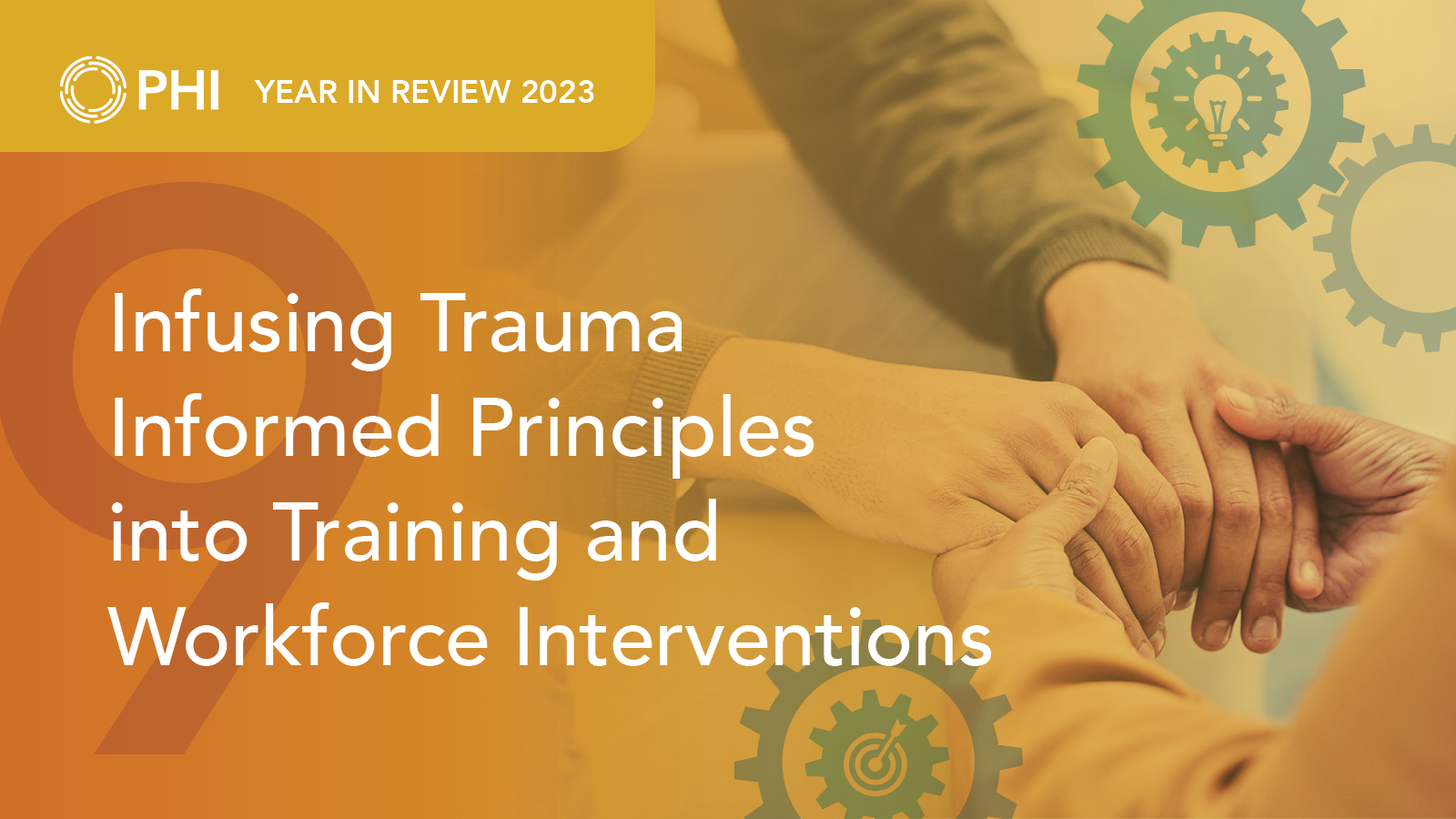
8. Infusing Trauma-Informed Principles into Training and Workforce Interventions
As workforce practitioners in direct care, PHI takes the lead in crafting solutions driven by the diverse experiences of workers. Our Workforce Innovations Team is taking measured steps to transform PHI training and workforce interventions by infusing principles of diversity, equity and inclusion and trauma-informed facilitation. In 2023, PHI staff members completed a trauma-informed facilitation training and began applying their new expertise across PHI’s training initiatives.
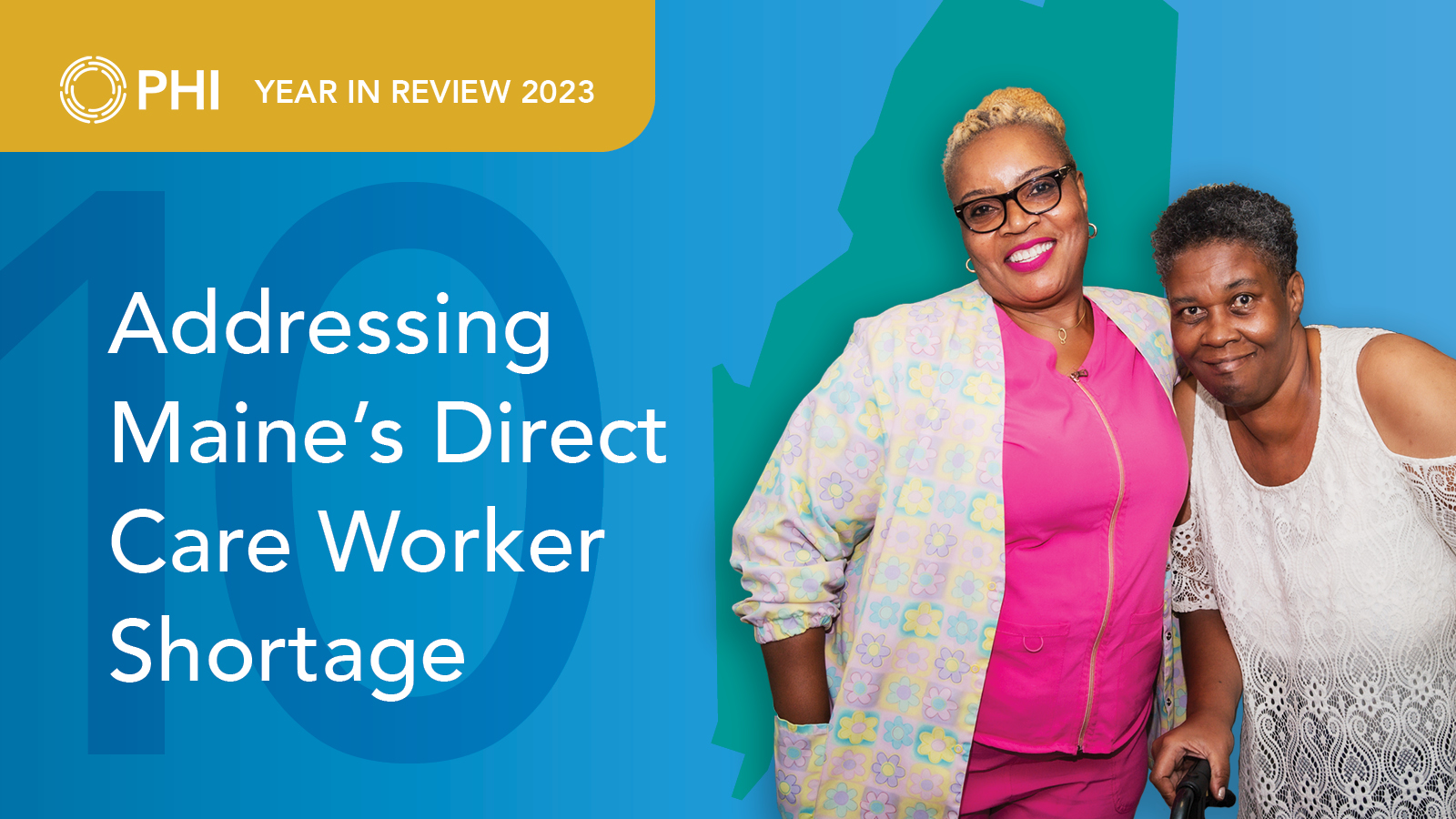
9. Addressing Maine’s Direct Care Worker Shortage
Maine is facing a critical shortage of direct care workers due to low pay and poor job quality, leading to a significant number of people experiencing unmet needs for essential care. To fix this, Maine’s Essential Care & Support Workforce Partnership in partnership with PHI is advocating for the state to make needed investments in Maine’s care economy. In May 2023, the group produced a report, led by the Maine Center for Economic Policy, summarizing the high costs of undervaluing direct care work.
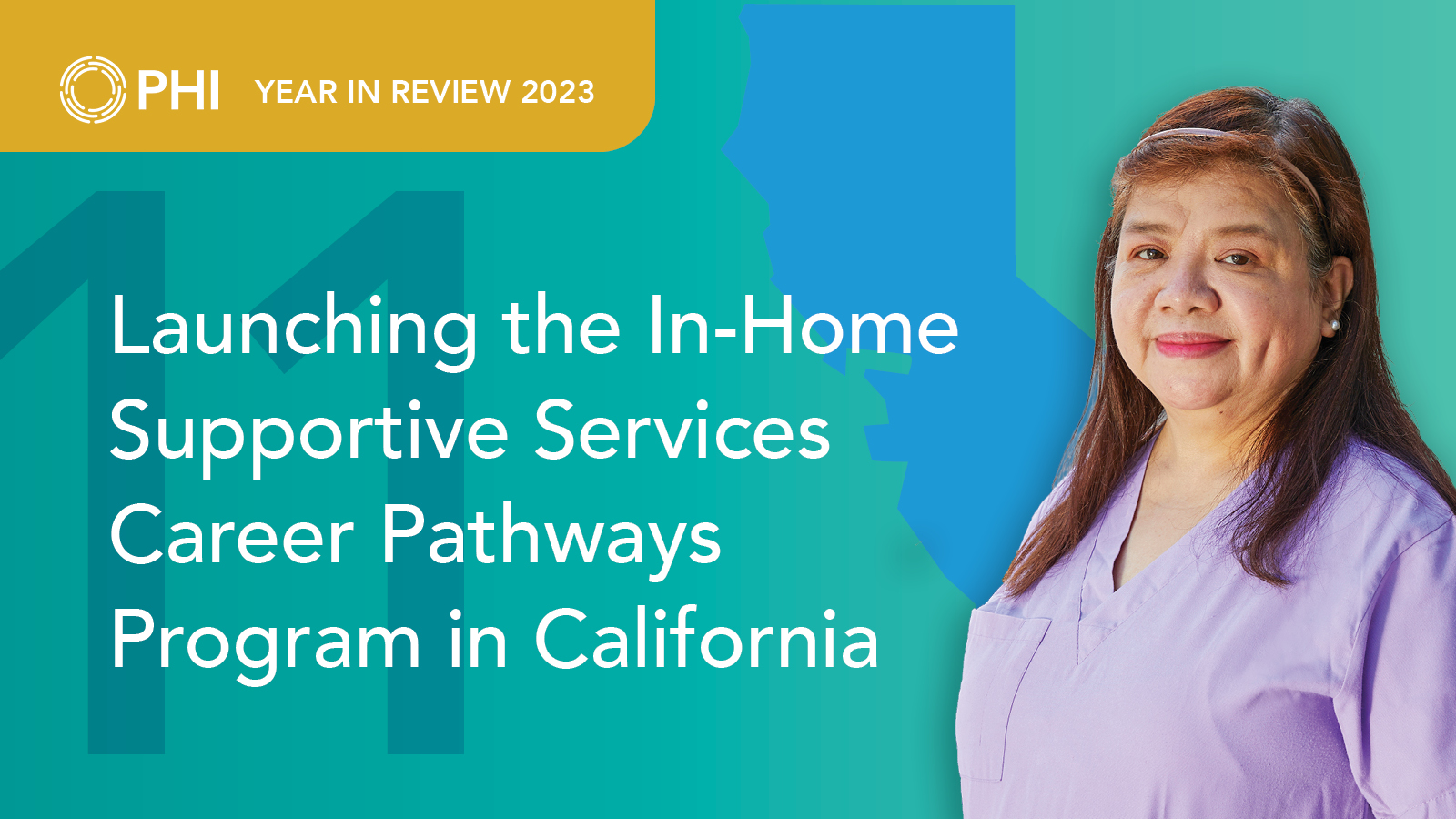
10. Launching the In-Home Supportive Services Career Pathways Program in California
This summer, PHI partnered with Homebridge, a San Francisco-based home care agency that has been in operation for over 30 years, in launching their In-Home Supportive Services Career Pathways Program in California. We produced more than 40 instructor-led online training modules on topics ranging from service delivery and safety, reaching approximately 550,000 IHSS providers statewide with valuable training and career development opportunities. This partnership also included the Corporation for Supportive Housing, Futuro Health, and the Zen Caregiving Project.
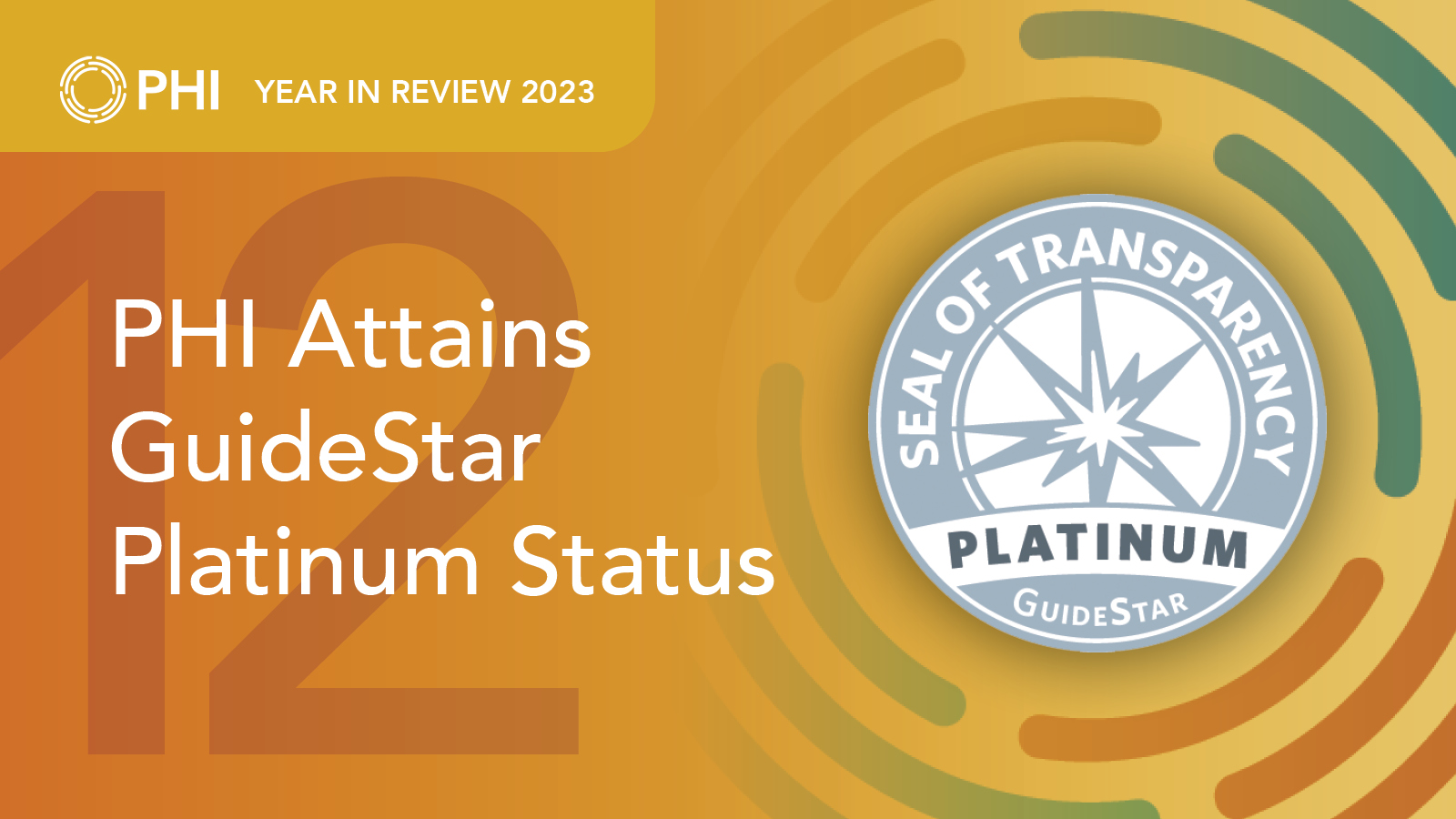
11. PHI Attains GuideStar Platinum Status
This year, PHI was awarded the Candid Platinum Seal of Transparency by GuideStar, the world’s largest source of information about nonprofit organizations. This recognition, achieved by fewer than 1% of U.S. nonprofits, highlights PHI’s commitment to financial transparency, sound governance, and measurable results in our mission. The Platinum Seal represents not just an acknowledgment of PHI’s past achievements but also a commitment to maintaining high standards of transparency and accountability.
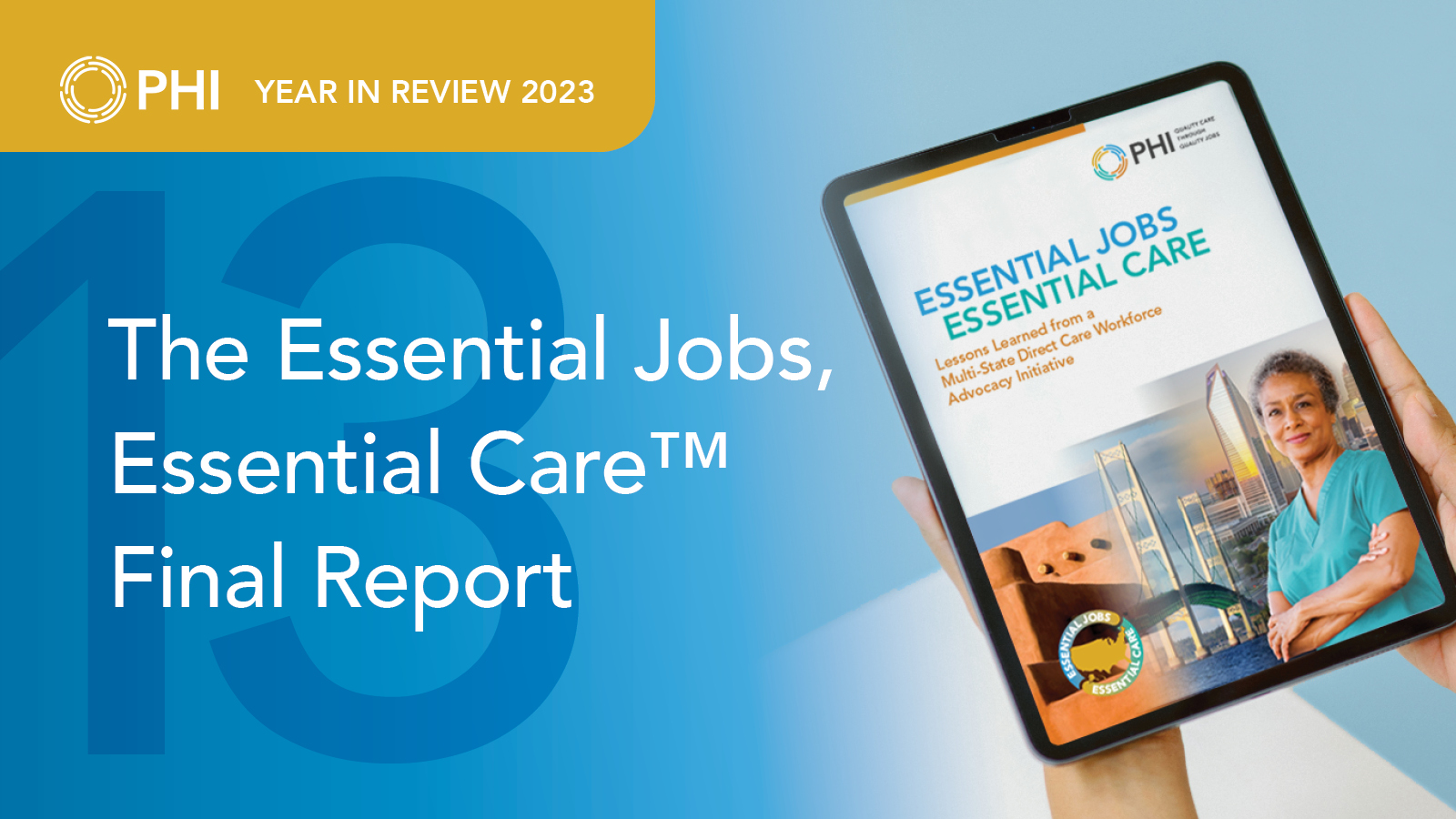
12. The Essential Jobs, Essential Care™ Final Report
This year we released a final report on the first phase of Essential Jobs, Essential Care, PHI’s multi-state advocacy initiative aimed at improving policies for direct care workers in the United States. Launched in 2020 in Michigan, New Mexico, and North Carolina, the initiative focuses on addressing issues like worker compensation, recruitment, training, and data collection in the direct care sector. Significant achievements in the first phase of the initiative included wage increases, new legislation for workforce data, and the establishment of a caregiving workforce council. This report encapsulates the efforts, partnerships, and lessons learned over a three-year period, setting a foundation for future advocacy and policy reforms in this critical field.
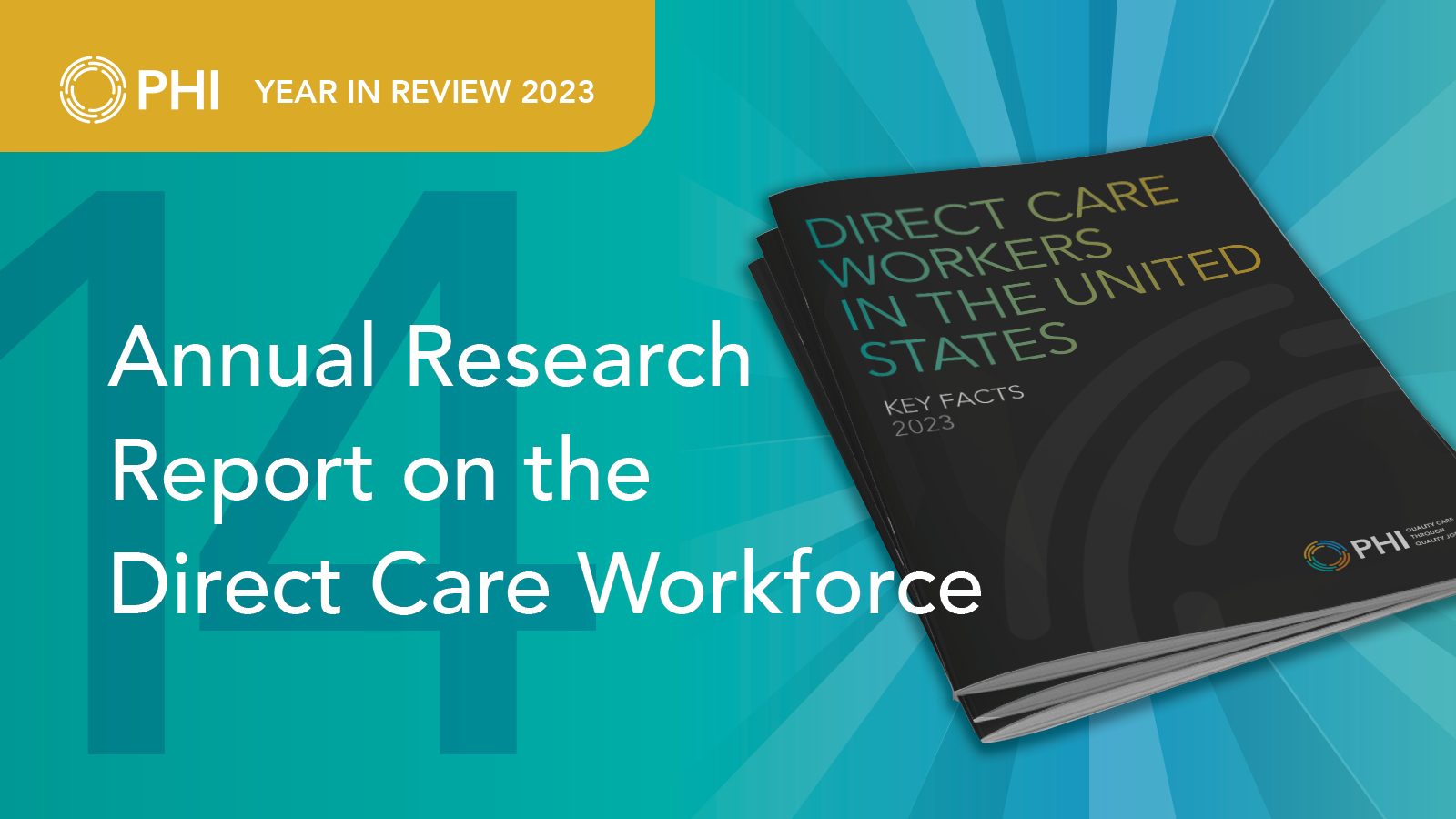
13. Annual Research Report on the Direct Care Workforce
Our annual research report on direct care workers provides essential data on this workforce, including demographics, occupational roles, job quality challenges, and projected job openings. Released in September, this year’s report confirms many of the long-standing challenges faced by this workforce and the long-term care field.. Additionally, among many other findings, the report shows that between 2021 and 2031, the direct care workforce is projected to add more than 1 million new jobs. During the same timeframe, nearly 9.3 million total direct care jobs will need to be filled.
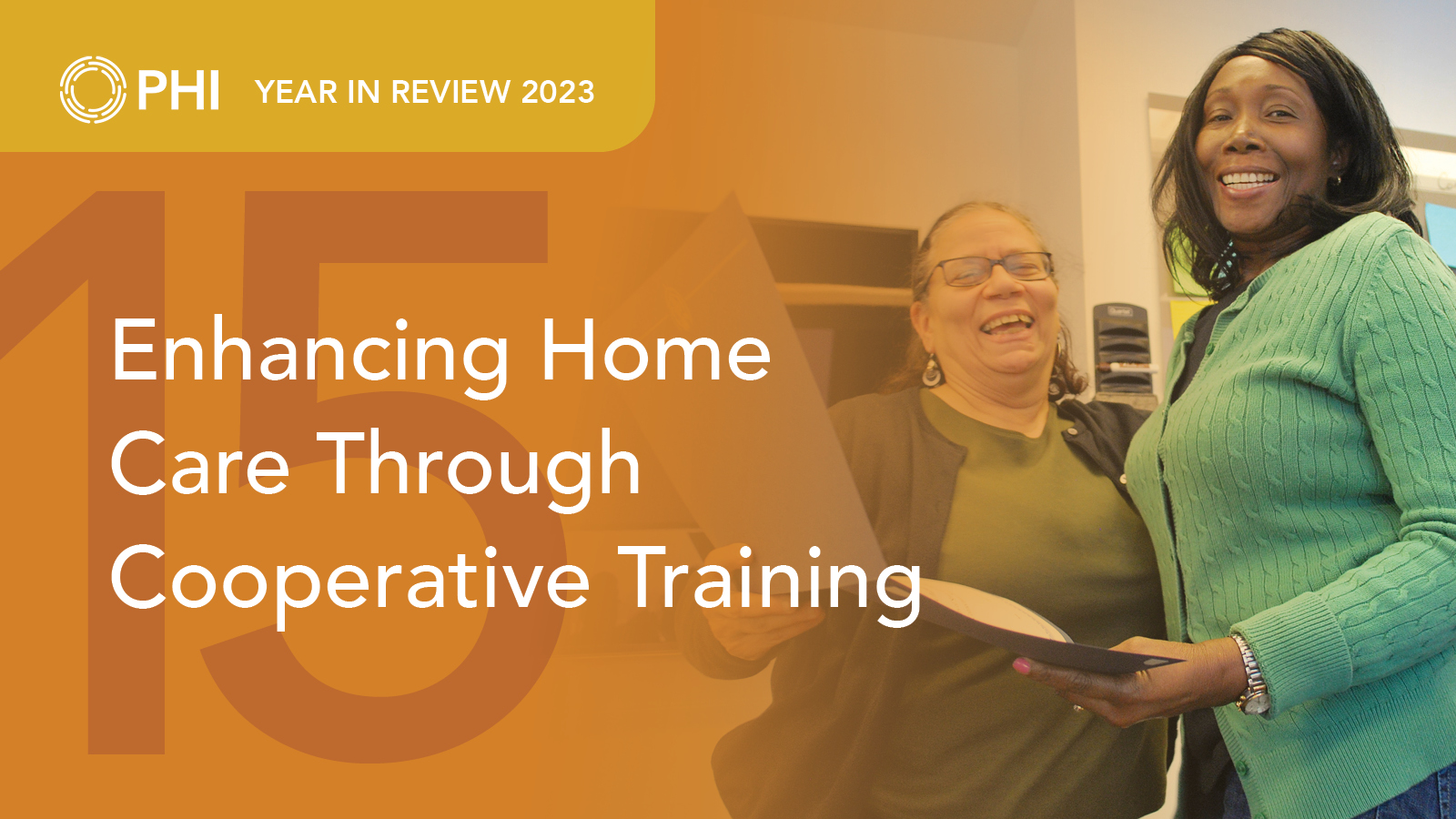
14. Enhancing Home Care Through Cooperative Training
As worker-centered businesses, home care cooperatives have helped improve working conditions for home care workers nationwide while also improving care. PHI adapted material from the Homebridge curriculum into a two-day course to support the Pilipino Workers Center (PWC) of Southern California and United Domestic Workers with funding through the CalGrows initiative. The program followed a train-the-trainer model, where select PWC facilitators were provided instruction and coaching from the PHI team and were then able to deliver the curriculum to more than 500 home care workers.
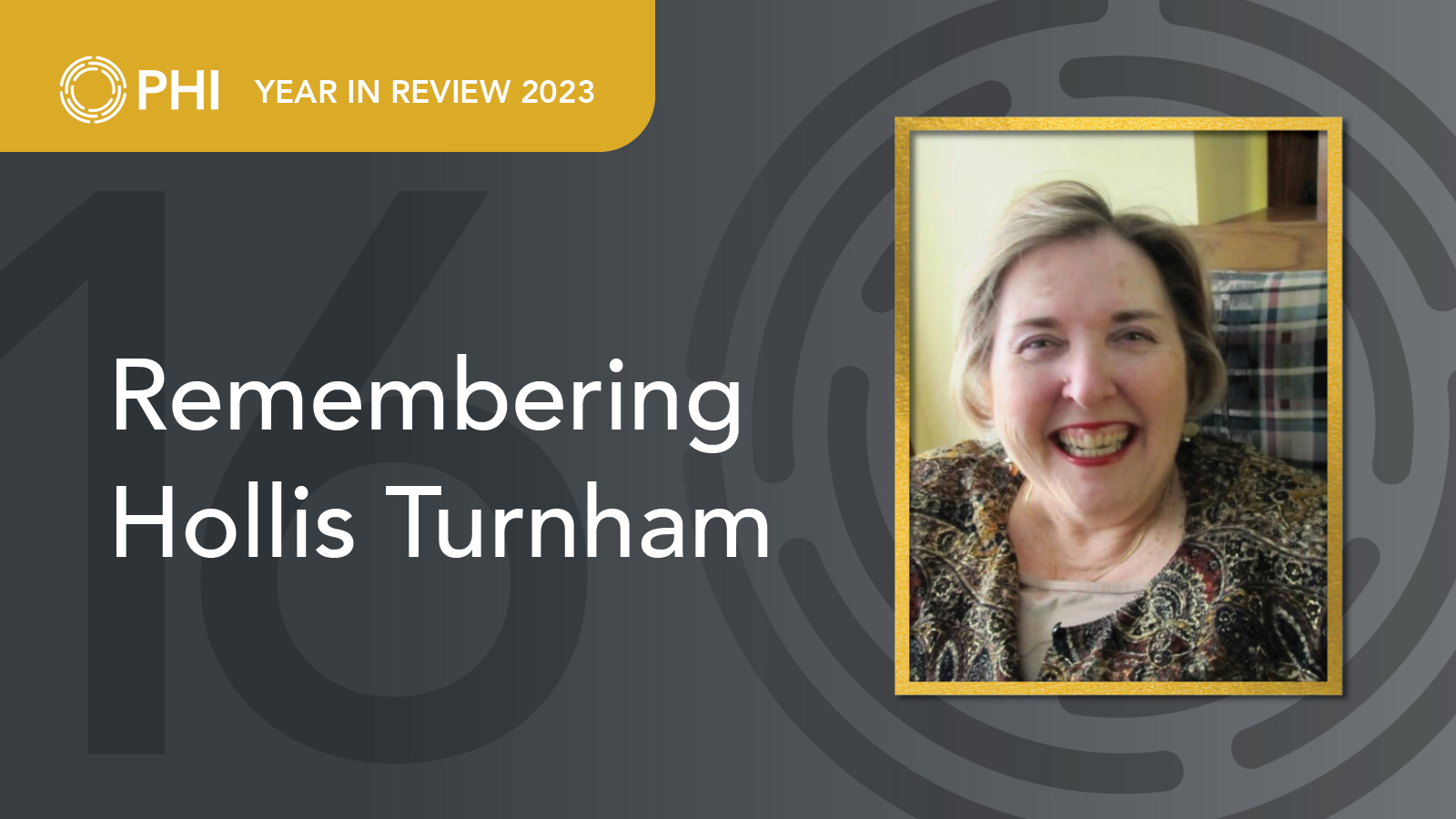
15. Remembering Hollis Turnham
In August, we remembered the legacy of Hollis Turnham, a stalwart advocate for the rights of older adults and direct care workers. Her career included serving as a VISTA Volunteer attorney at a Navajo reservation and as the Michigan State Long-Term Care Ombudsman. In her role at PHI, she served as the Midwest Director and Michigan Manager for PHI-Quality Care through Quality Jobs for 15 years, where she played a crucial role in advocating for the rights of direct care workers at state and federal levels. Her efforts in shaping policies and practices have had a lasting impact on care recipients and caregivers.
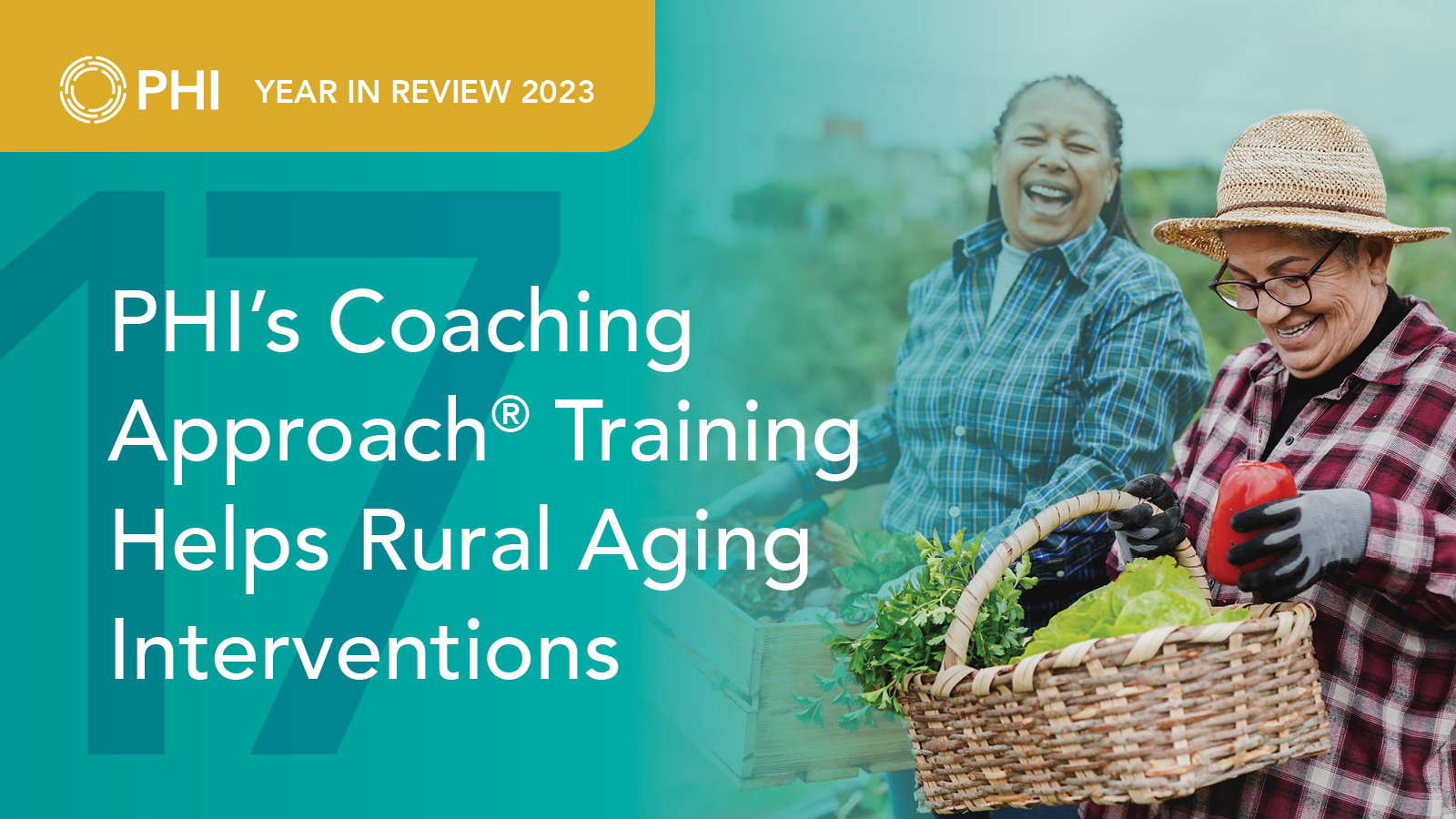
16. PHI’s Coaching Approach® Training Helps Rural Aging Interventions
Despite significant challenges, opportunities exist to enhance the well-being and health of older adults living in rural communities. This year, PHI partnered with Lutheran Services in America to develop and deliver a strengths-based assessment tool and tailored training plan for Rural Aging Action Network coordinators, focusing on active listening and self-awareness. This approach has successfully fostered trust and emotional connections between coordinators, older adults, and the direct care workers that support them in rural U.S. communities, demonstrating an innovative strategy for improving the well-being of this population.
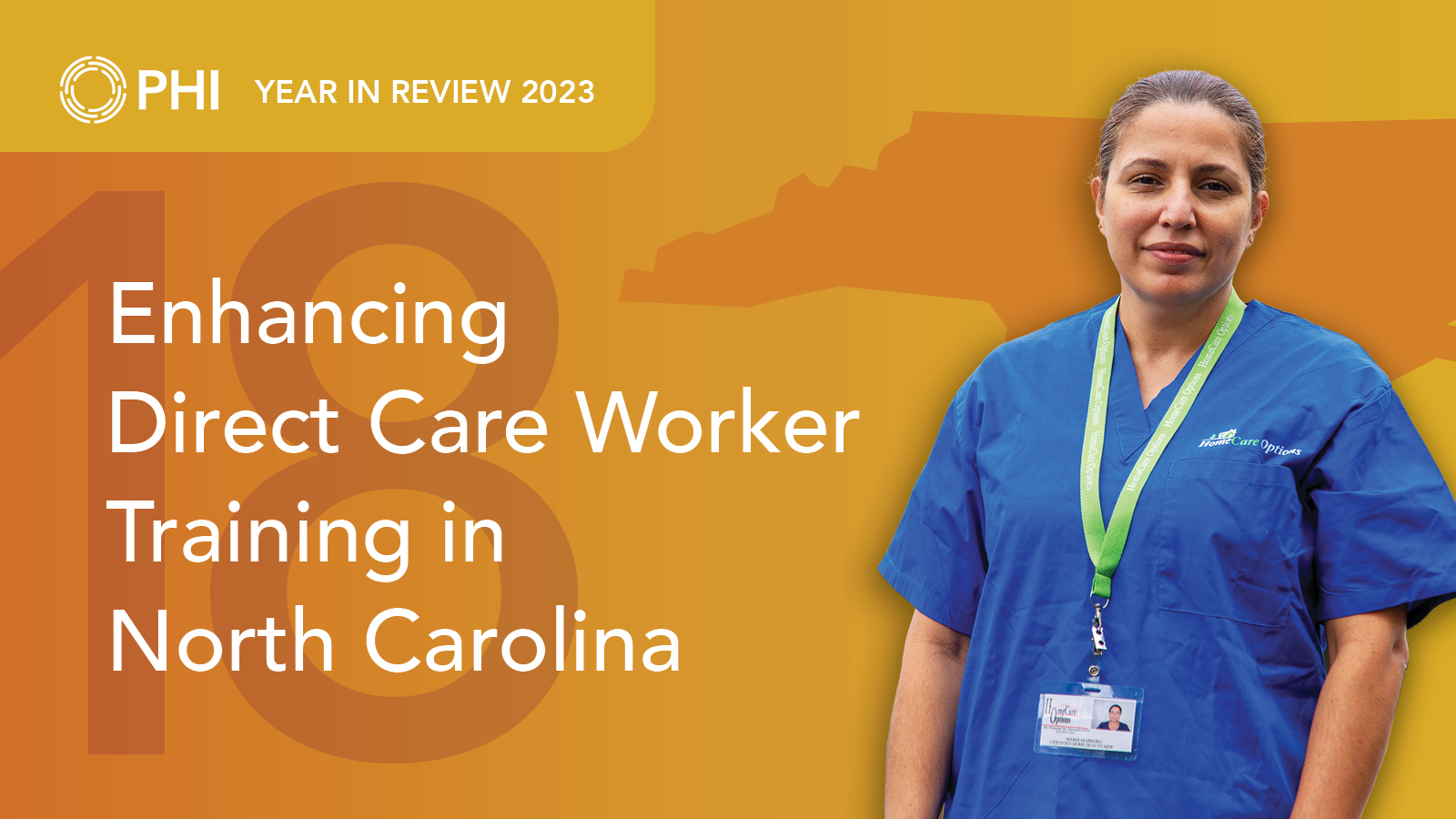
17. Enhancing the Direct Care Worker Training Landscape in North Carolina
The Workforce Engagement with Care workers to Assist, Recognize and Educate (WECARE) project, led by Duke University in partnership with PHI and other key organizations, aims to strengthen the direct care workforce in North Carolina. Supported by federal funds, the goals of WECARE are to develop a statewide training direct care training and credentialing model; pilot-test an improved training and employment program based on the model; and build public recognition of this critical workforce. Research conducted this year indicates current training requirements in the state are complex and lack portability, with a critical need to build in more relational and interpersonal competencies.
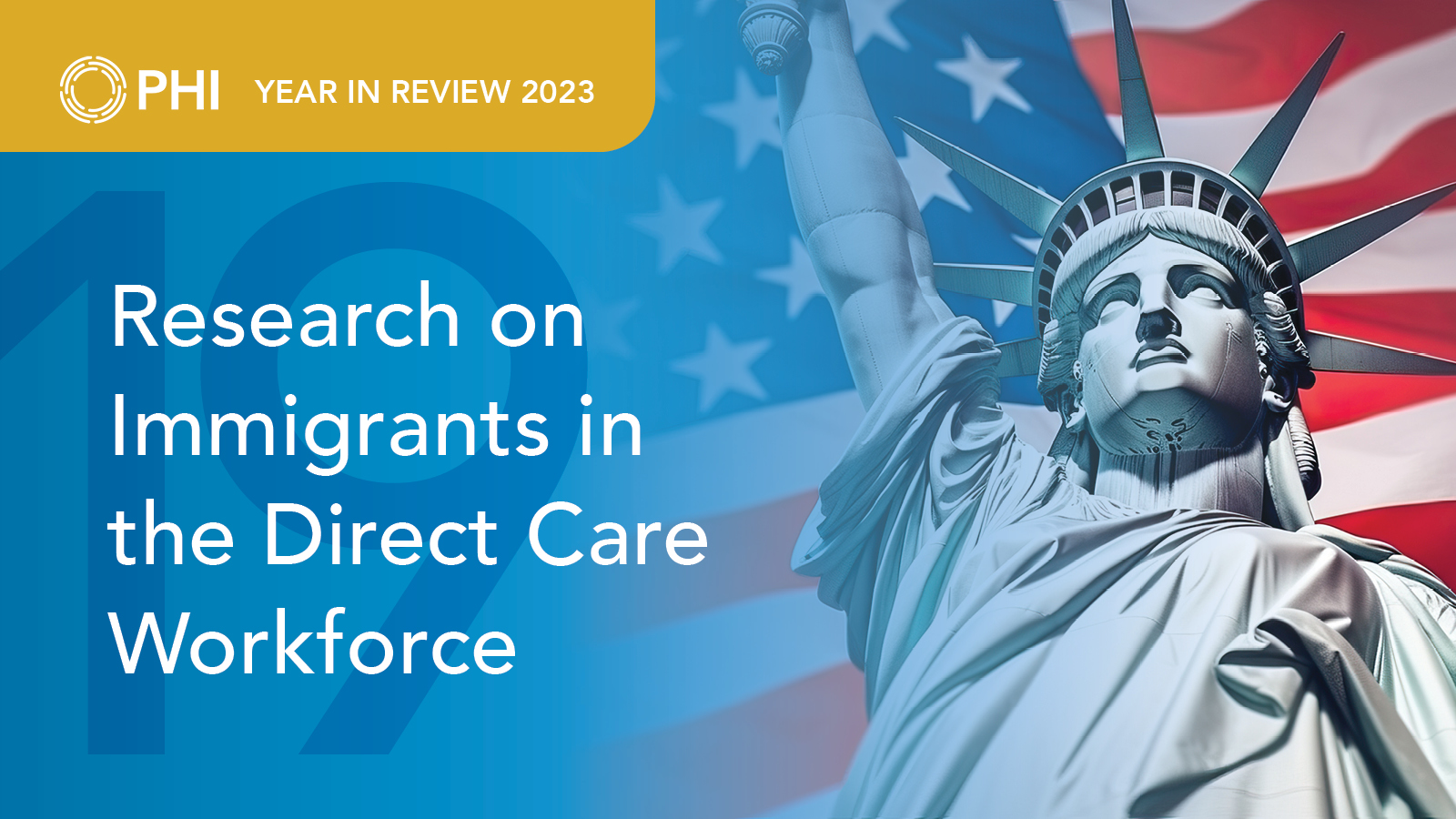
18. Research on Immigrants in the Direct Care Workforce
Immigrants have long been critical to the direct care workforce, ensuring that employers are better able to fill job openings in this sector and that consumers can access quality care. This year we released a new report that underscores the importance of immigrants to the direct care workforce, especially as the long-term care sector struggles to fill an estimated 9.3 million job openings in direct care in the decade ahead. The report highlights that immigrants constitute at least 27% of direct care workers, a proportion that has grown over the last decade.
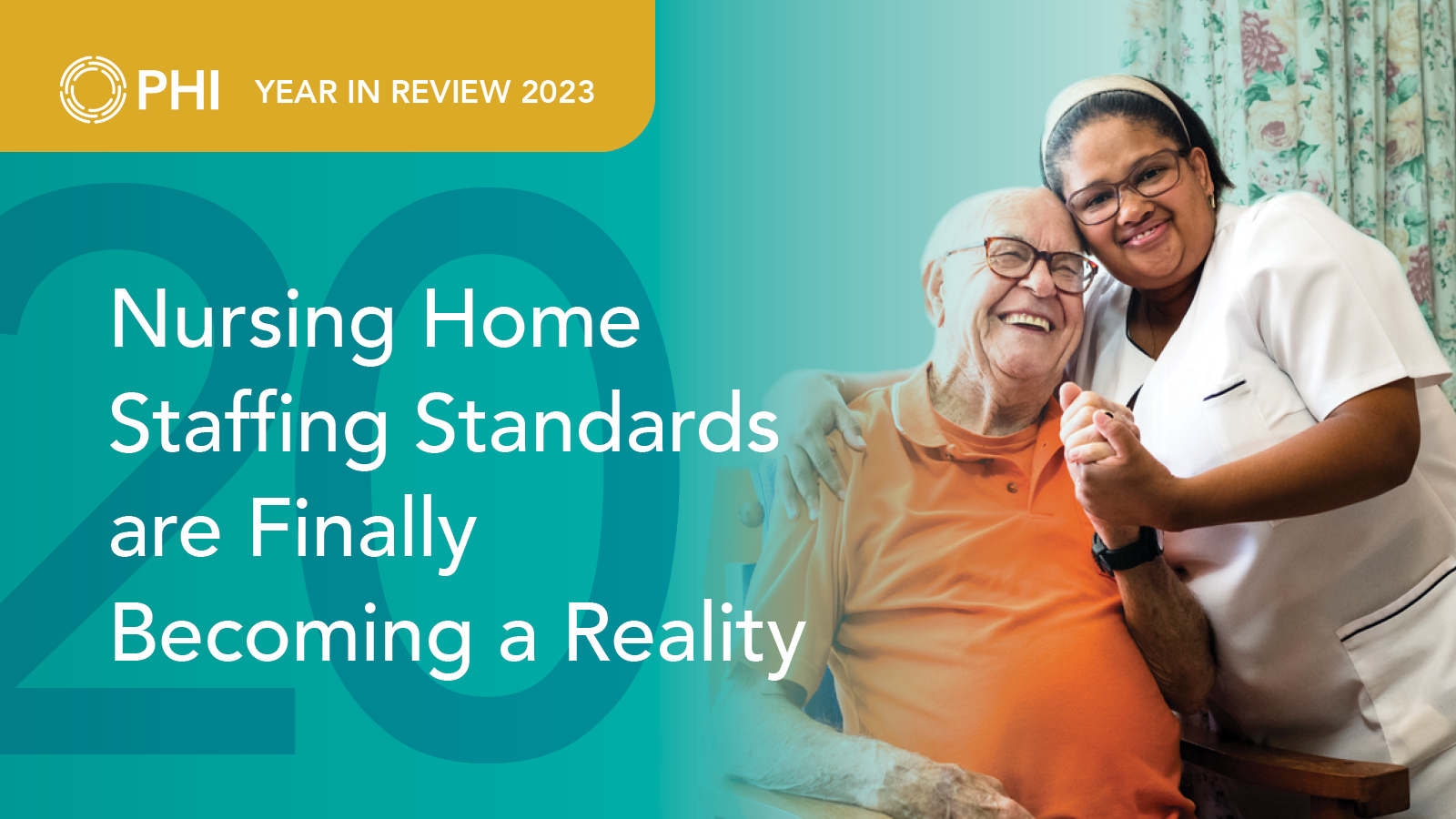
19. Nursing Home Staffing Standards are Finally Becoming a Reality
On September 1, just a few days before Labor Day, the Centers for Medicare & Medicaid Services (CMS) released a long-awaited proposed rule on minimum staffing levels in nursing homes nationwide. The proposed minimum staffing level and other provisions represent the most significant nursing home regulatory reform for decades, and PHI celebrates this major step forward. In response to the proposed CMS Nursing Home Standards, PHI provided extensive feedback and recommendations, sharing our comments publicly to support other advocates’ efforts as well. PHI’s response focuses on ensuring that these standards reflect the interconnected needs of nursing home residents and the workforce.
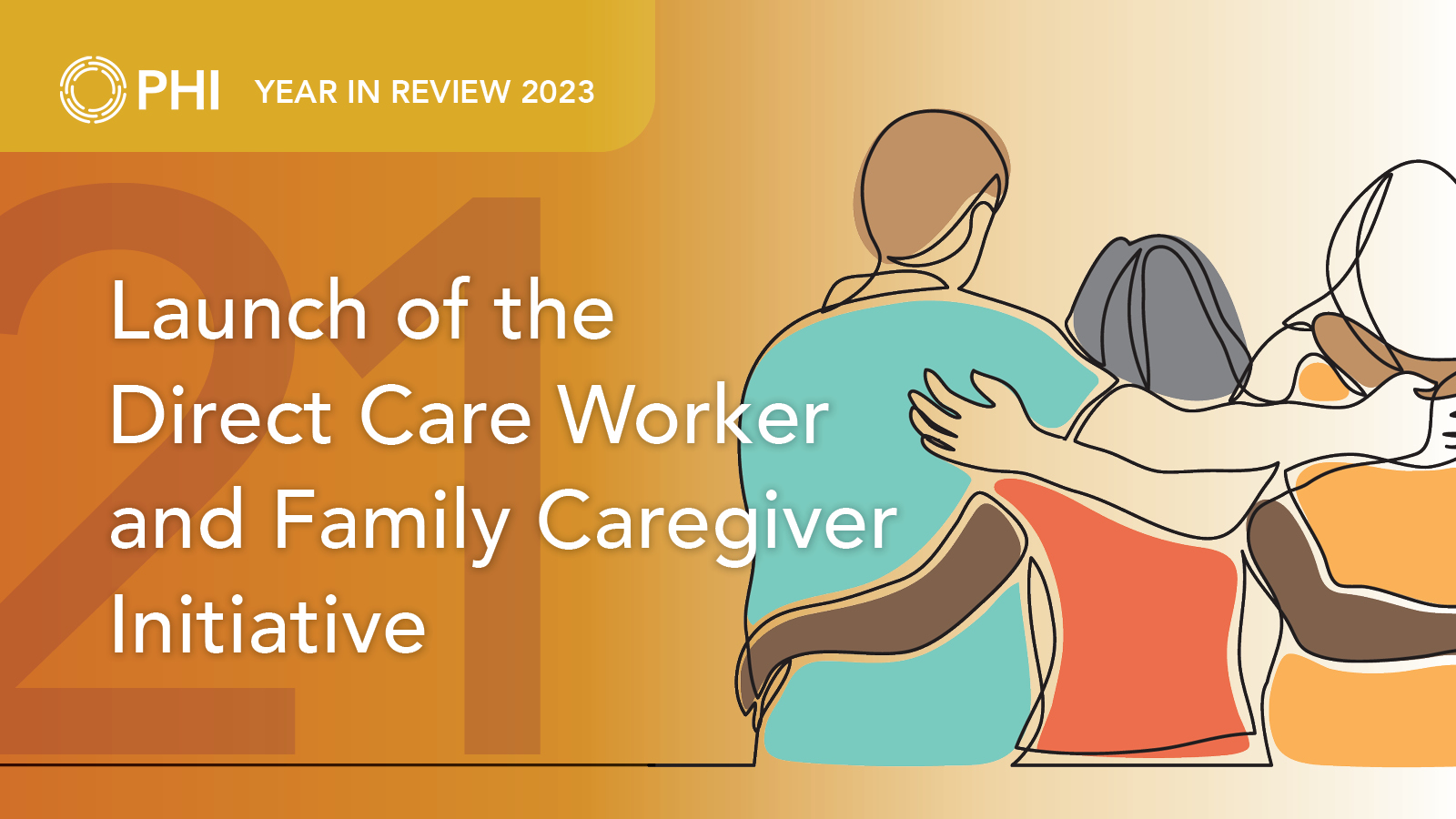
20. Launch of the Direct Care Worker and Family Caregiver Initiative: Together in Care
As the need for care continues to rise, the roles of direct care workers and family caregivers are absolutely vital. Together, these caregivers form the common thread that weaves through the fabric of our long-term care system. The launch of the Direct Care Worker and Family Caregiver Initiative marks a significant step forward in addressing the needs and challenges faced by both direct care workers and family caregivers. Led by PHI in tandem with the National Alliance for Caregiving, and funded by the John A. Hartford Foundation, this initiative aims to provide comprehensive support and resources to these groups through a range of awareness-raising and advocacy activities.
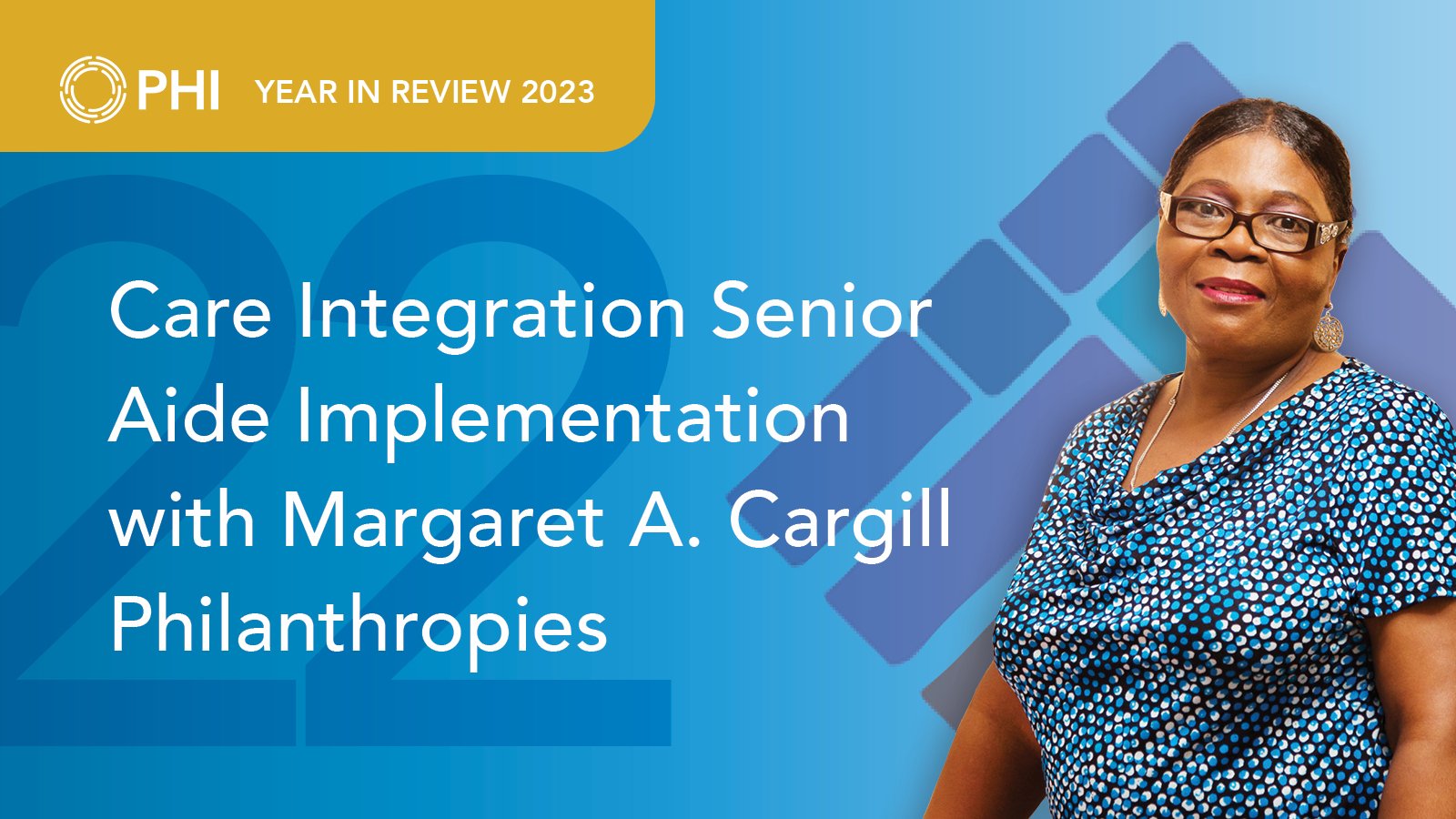
21. Care Integration Senior Aide Implementation
PHI partnered with a managed care plan (Inclusa) and two home care agencies (Nicolet and GT Independence) in Wisconsin to implement and test the innovative Care Integration Senior Aide (CISA) role. The intention with this advanced home care role is for CISAs to be formally included in care teams and trained to support better client outcomes related to chronic conditions and social determinants of health. In October 2023, the first CISAs were officially deployed in the field through our partner agencies. This was supported by funding from Margaret A. Cargill Philanthropies.
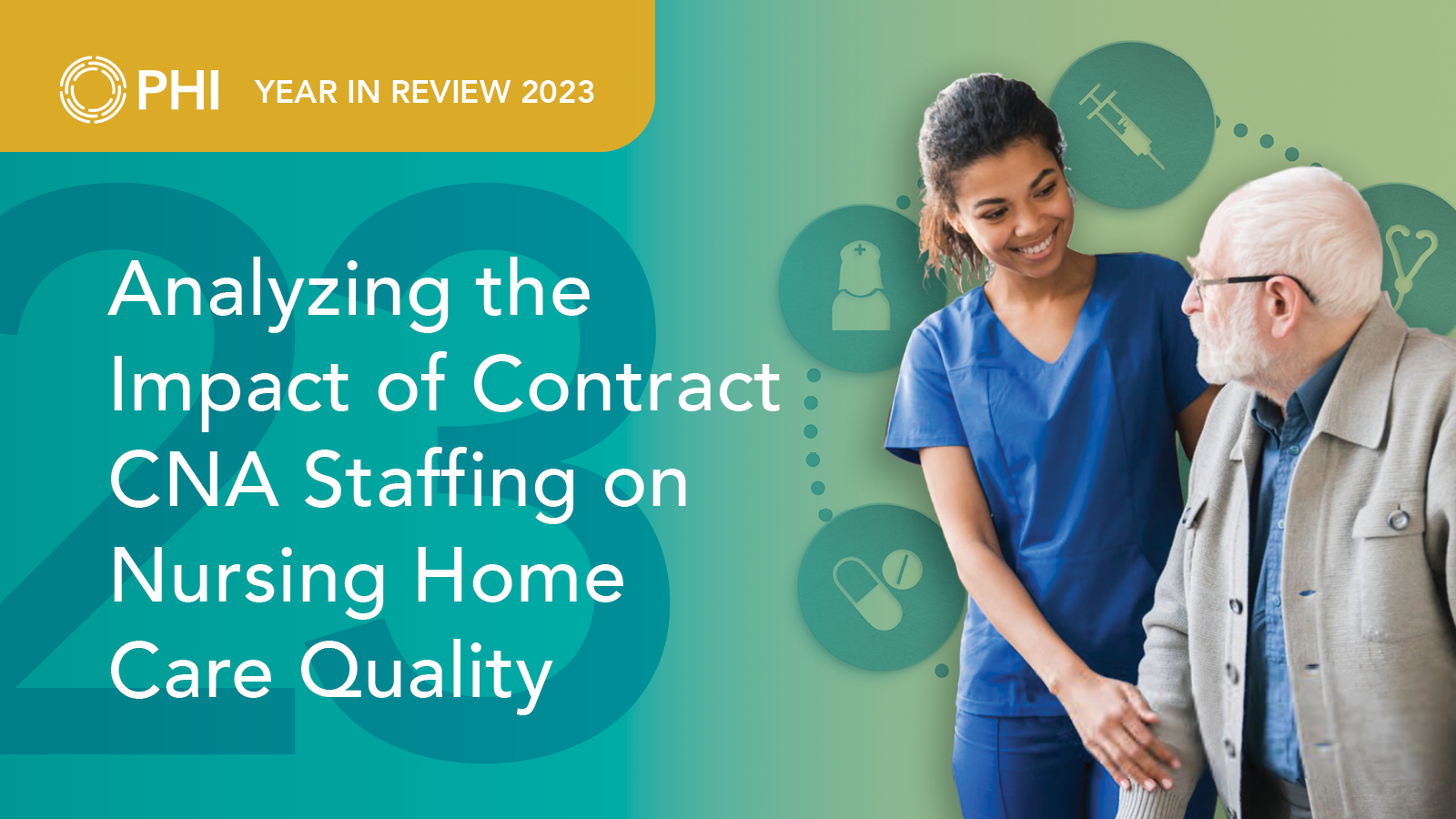
22. Analyzing the Impact of Contract CNA Staffing on Nursing Home Care Quality
In collaboration with the University of California, San Francisco (UCSF) Health Workforce Research Center on Long-Term Care, PHI conducted a study to analyze the increasing use of contract certified nursing assistants (CNAs) in nursing homes from 2017 to 2022. Utilizing a range of datasets, the research revealed a notable pre-pandemic growth in contract CNA staffing, which surged substantially during late 2020 and early 2021. Moreover, the study found a consistent and significant correlation between the use of contract CNA staffing and poorer care quality outcomes in nursing homes. The study findings will be published in late 2023.
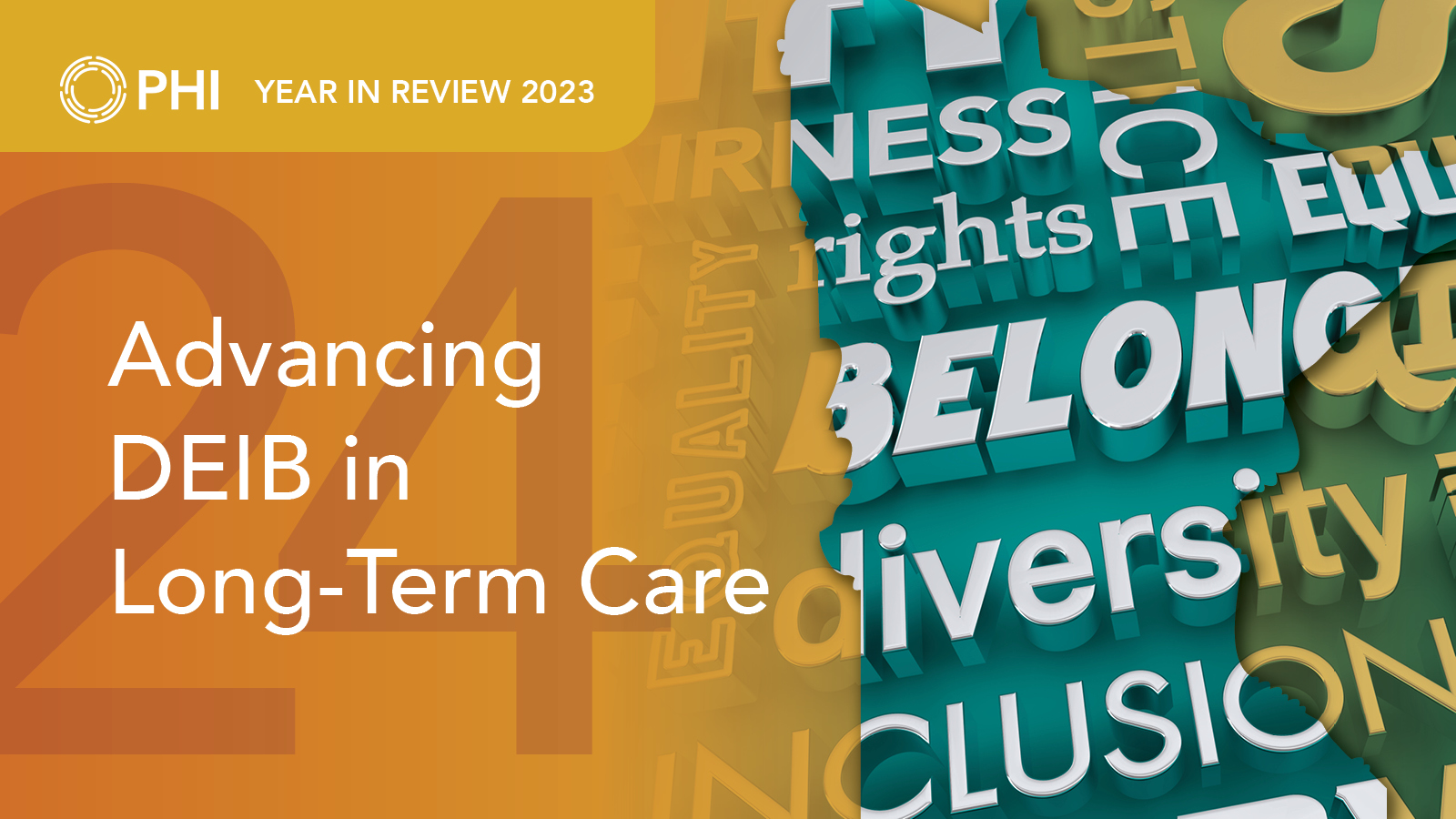
23. Advancing DEIB in Long-Term Care
PHI worked with LeadingAge Minnesota Foundation to assess current diversity, equity, inclusion, and belonging (DEIB) practices, challenges, and opportunities among LeadingAge Minnesota’s member organizations across the state. This assessment culminated in a set of actionable recommendations for how LeadingAge Minnesota Foundation and Association can best support member organizations in their DEIB efforts.





